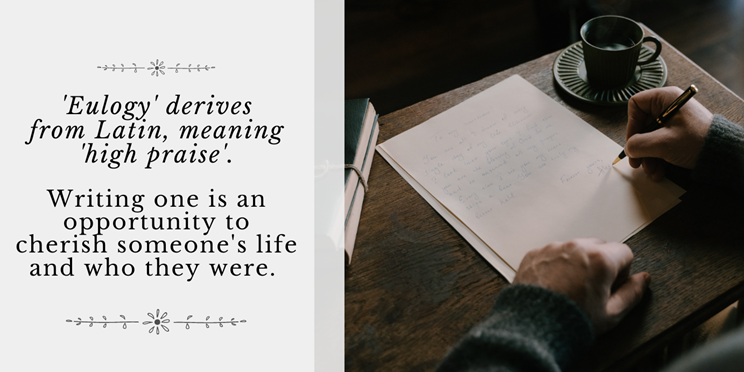Writing a Meaningful Eulogy – Six Simple Tips
Writing a eulogy can feel daunting – sometimes as though you can put nothing into words, others as if there is simply too much to know what to write first. The good news is that both of these are normal, will just take time, and mean that what you do write will be meaningful and reflective of the person you are trying to honour. There are some additional ways to help yourself through the process:
1. Write everything down
This is a good tip for writing anything in life but is especially helpful when you are trying to understand a lot of emotions and put them to paper. Start in a notebook, don’t cross things out – write everything that comes to mind no matter how small it seems, it will allow you to start giving some structure to the raw feelings that are going through your head.
2. Be straight with how you are feeling
You can’t easily describe a feeling, even to those who feel the same; but you can evoke it with stories. Don’t be afraid of your emotion and be open with the way that you feel – personal memories can mean a great deal to those who are also remembering someone.

3. Use a simple structure
Introduction, middle and conclusion, it only needs to be as simple as that. You don’t have to start at the beginning, either – if a personal story is coming to mind first that means a lot to you, you can write the others after and vice versa. It will make it as easy for you on the day as possible to have things in a defined order.
4. Read aloud to keep time in mind
Writing and reading are two very different things, and spending after a while on a piece of writing it’s easy to lose track of when you started and how much you still need to do. When you have a good amount written down, practice reading it aloud or in your head, maybe even in front of a mirror. This way you will know how easy it reads and is heard, and whether or not your eulogy is too short or long. The former is less of an issue, no matter how brief – if even just a few sentences, these can be deeply meaningful – but although it is a very emotional day, there will often be a set schedule to move from one stage of the funeral to another. The usual length for a eulogy is around 4-7 minutes, as a rough guide.

5. You don’t have to write it all yourself
A common option seen at a lot of funerals is the inclusion of readings, often from poetry or another form of writing that may have influenced the person who has died, was their favourite, or what you think encapsulates their life and memory. If you feel as though your own experiences are too much to talk about in front of others just yet, this is a good alternative that is still deeply personal.
6. End on a positive note
We like to think of funerals as more than just a sad occasion – they are a chance to be appreciative together of someone that meant a lot to all of you. They are a necessary step for us to rebuild, why else would they be universal to us as humans in one way or another? With these things in mind, it’s a good idea to finish a eulogy with some words that lift everyone, with a smile or laughter, and be thankful that they knew the person you are all there to celebrate.
A eulogy is not an easy thing to write that you have to read on not an easy day, but everyone is there to support you, and you will be glad to look back on the fact and memory that you did. Many people even say that speaking at their loved one’s funeral is as if they are speaking with them, and giving their thanks as a way of finding peace with themselves.
If you’re looking for more support on the topics discussed here, feel free to read our other blogs, and see what we can do to accommodate funeral wishes.




